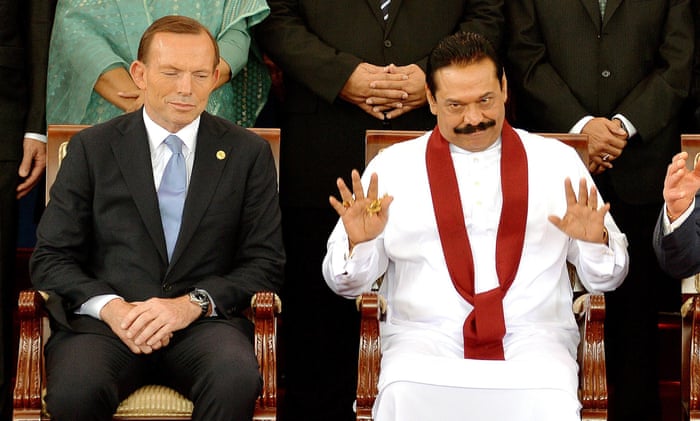A Brief Colonial History Of Ceylon(SriLanka)
Sri Lanka: One Island Two Nations
A Brief Colonial History Of Ceylon(SriLanka)
Sri Lanka: One Island Two Nations
(Full Story)
Search This Blog
Back to 500BC.
==========================
Thiranjala Weerasinghe sj.- One Island Two Nations
?????????????????????????????????????????????????Wednesday, March 30, 2016
Abbott's Sri Lanka comments 'excuse war crimes', Tamil refugee advocates say
Abbott
describes former Sri Lankan government’s handling of country’s conflict
as ‘unavoidable actions taken to end one of the world’s most vicious
civil wars’
Tony
Abbott and former Sri Lanka president Mahinda Rajapaksa at the
Commonwealth Heads of Government Meeting in 2013. Sri Lankan refugee
groups say Abbott’s comments about the government’s actions in its
long-running civil war were ‘predictable but despicable’. Photograph:
Pool/Getty Images
In an article in Quadrant magazine Abbott defended his national security recordas
prime minister: “I’m sure that the Sri Lankan president was pleased
that Australia didn’t join the human rights lobby against the tough but
probably unavoidable actions taken to end one of the world’s most
vicious civil wars”.
The foreign minister, Julie Bishop, has rebuked one aspect of his
comment, telling Guardian Australia that the government had
“consistently raised human rights issues with the former Sri Lankan
government”.
Abbott did not indicate what actions or lobby groups he was referring to.
The United Nations has said it found evidence “strongly indicating” war
crimes, including torture, executions, forced disappearances and sexual
abuse committed by the Sri Lankan security forces against the country’s
Tamil ethnic minority, who were fighting a separatist war.
Asked about allegations of torture in 2013 at a Commonwealth heads of government meeting in Sri Lanka, Abbott said:
“The Australian government deplores any use of torture ... wherever it
might take place.” He added: “But we accept that sometimes in difficult
circumstances, difficult things happen.”
Tamil Refugee Council convenor Trevor Grant told Guardian Australia “he excused torture then, now he’s excusing war crimes”.
Grant said Abbott’s comments were “predictable but despicable” as Abbott
had “a history of aligning himself with the brutal [Rajapaksa] regime”,
referring to their cooperation on stopping boats of asylum seekers
from Sri Lanka reaching Australia.
“For Abbott to say that sort of thing flies in the face of all known
facts, put out there not just by Tamil groups but also by independent
investigators of the UN.”
Grant said UN reports in 2015 and 2012 had concluded that the Sri Lankan military bombed hospitals and no-fire zones.
The 2012 report also
found the Tamil Tigers were responsible for human rights abuses,
including forced conscription of teenagers for their military service
and as suicide bombers.
Grant called on Bishop to reject the claim the Sri Lankan government’s
actions were unavoidable, which he said was “wrong and dishonest”.
Australian Tamil Congress national spokesperson Sam Pari said “it is
disappointing that rather than upholding human rights, Abbott chose
instead to please the Sri Lankan president who failed to protect and
promote international human rights law and international humanitarian
law”.
Human Rights Watch Australia director, Elaine Pearson, said Abbott’s comments were unacceptable and offensive.
“The UN has described the final stages of the war as a bloodbath – tens of thousands of people were slaughtered in indiscriminate shelling.
To suggest that war crimes are ‘tough but probably unavoidable’ is
giving a green light to abusive leaders and armies everywhere,” she
said.
“It is a slap in the face to the tens of thousands of victims of wartime atrocities and their families.”
Abbott said Australia and Sri Lanka “became even stronger partners in
the Abbott government’s most urgent initial task: to end the
people-smuggling trade that had resulted in more than 1,200 deaths at
sea, more than 50,000 illegal arrivals by boat and more than $10bn in
border protection budget blow-outs”.
Labor’s foreign affairs spokeswoman, Tanya Plibersek, said: “I think it
would be a good thing for the foreign affairs minister to have a few
words to Abbott about some of these comments.
“One of the reasons Australia is so well regarded internationally over
the course of our history is because we are a responsible international
citizen and part of that means standing up against human rights abuses,
whenever they happen.
“That’s not lecturing our neighbours, that’s just being a good
international citizen that says that we value democracy and we value
human rights and we value them not just for Australians but for all
people.”
Julie Bishop says Australia has welcomed Sri Lanka’s recent commitments
to establish independent and credible criminal and transitional justice
mechanisms. “If effectively implemented, these proposals will provide
Sri Lanka with a platform to achieve genuine reconciliation,” she said.
“For that reason, and as a long-standing friend, Australia stands ready
to assist Sri Lanka as it implements these proposals for dealing with
the past.”
Abbott has been contacted for comment.

